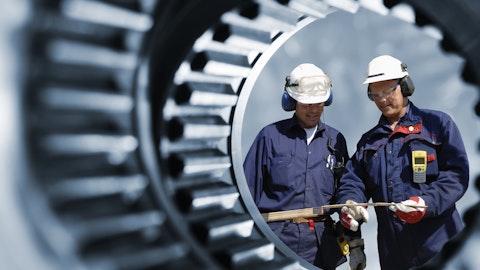Fei Chen: We are going — we are selling this kind of system through the partners. So basically, we are selling directly to our partners so they purchase the equipment from us, then they run at customer site. They’re selling further to the customer site. So this is a very good model for us because we are small company do not have so much capital. So this is the way we are working on.
Craig Rose: Okay. And what is the capacity that you’re expected to offer as far as like barrels per day for the process you’ll be involved in?
Fei Chen: And in those small pilot units, we can treat the water between 3,000 to 5,000 barrels per day. But our onset design, we are able to scale up to like 100,000 barrel play is okay for — I mean we have the model design concept, we’re able to scale up. So that’s why we are very excited to have those pilot projects going on, especially in U.S. because it’s a very interesting market for us. That is our strategic process market, and we hope this pilot unit up running fast and we are able to get the data and also the [indiscernible] we’re able to scale up a full-scale commercial system in U.S.
Craig Rose: Okay. And so 100,000 barrels per day, what would your process cost a service provider to buy that system that is capable of 100,000 barrels a day?
Fei Chen: I cannot answer that question here now because it very much depends on what kind of water quality you have because we need to adjust what kind of elements in our system and [indiscernible]. So it’s very much site specific. And also, there’s a lot of conditions on the facility [indiscernible] be connected to that. So it’s really — that’s something we discussed over time when the customer and the partner come with the request, and we will discuss with them. And the more interesting thing is more discussing about the cost to treat [indiscernible] of water because that’s what the industry is using to compare to each other and we are confident our treatment cost will be comparable with other competitive technology. This is more of the things [indiscernible].
Craig Rose: And so what is that value? Is that $1, $2, $3 per barrel?
Fei Chen: It’s a range. It’s a range. I think it’s between $0.50 to $1, something like that.
Craig Rose: Right. But as you said earlier, you’re only doing a small portion of the cleanup of the produced water, correct? You’re a pretreatment. Is that before or after they kind of clean some of the chemicals first to treat the water?
Fei Chen: It depends on the application.
Craig Rose: Are you involved in like [indiscernible] at the end? Or are you involved in taking the chemicals out in the beginning?
Fei Chen: We are only doing the pretreatment. So basically, if you’re using the water for reinjection, then our technology is efficient enough. You don’t need any other additional technology. You’ll need a water for agriculture irrigation then you might need a desalination and that’s not something we are working. We’re only working on our technology.
Craig Rose: Okay. All right. That’s helpful. The release was a little untraditional and break out the fourth quarter [technical difficulty]. I guess the formal release will be — will have more detail of this quarter. Is that correct?
Fei Chen: Sorry, I almost cannot hear what you say.
Craig Rose: You reported full year, you didn’t break out the quarter. That’s a little untraditional. I guess your filings with the government will have more detail.
Fei Chen: We are [indiscernible] last year and now. We gave a guidance for each quarter a time.
Craig Rose: Thank you very much.
Fei Chen: Thank you.
Operator: Thank you. This concludes our question-and-answer session. I would now like to turn the call back over to management for closing remarks.
Fei Chen: Thank you. I would like to thank you all very much for being with us today. We look forward to communicating with you soon again. Thank you.
Operator: The conference has now concluded. Thank you for attending today’s presentation. You may now disconnect your lines.
Follow Liquitek Enterprises Inc (NASDAQ:LIQT)
Follow Liquitek Enterprises Inc (NASDAQ:LIQT)
Receive real-time insider trading and news alerts


